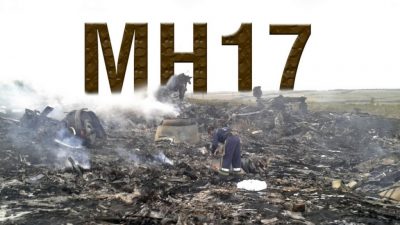Washington Blames Iran for Ukraine Airliner Crash. Was the Plane Brought down by a Missile?

Update
The latest information suggests that the Ukraine plane was brought down by a missile, following statements emanating from the Iranian government.
…
On Wednesday, Ukraine Airlines Flight 752 crashed minutes after departing from Tehran’s International Airport.
All 167 passengers and nine crew members perished, including 135 Iranian and 32 foreign nationals.
Iran’s Civil Aviation Organization said the aircraft caught fire in flight shortly after takeoff.
Initially heading west, it changed course for an attempted landing because of a likely technical malfunction.
No evidence suggests foul play. Yet AP News cited unnamed US, UK, and Canadian officials, claiming it’s “highly likely” an Iranian missile downed the aircraft, adding:
“They said the fiery missile strike could well have been a mistake amid rocket launches and high tension throughout the region.”
A Reuters report was similar, saying the Ukraine aircraft “was likely brought down by an Iranian missile,” citing Canadian PM Justin Trudeau and “intelligence from Canadian and other (unnamed) sources.”
Iranian officials debunked false claims about a missile or rocket downing the Ukraine airliner.
Iran’s Civil Aviation Organization head Ali Abedzadeh said the following:
“From a scientific viewpoint, it is impossible that a missile hit the Ukrainian plane,” adding:
“The plane caught fire three minutes into the flight, according to what the witnesses have reported and the data collected from the parts of the airplane.”
“The pilot tried to return the airplane at the altitude of 8,000 feet, but due to the fire, the airplane crashed and exploded.”
“We can say that the airplane, considering the kind of the crash and the pilot’s efforts to return it to Imam Khomeini airport, didn’t explode in the air. So, the allegation that it was hit by missiles is totally ruled out.”
“(B)ecause the airplane was Ukrainian, Ukraine is obliged to cooperate with us, and has started cooperation. Their team of experts has arrived in Tehran, and we have coordinated the issue with them on different aspects.”
“Iranian experts and the Ukrainian ones have had a meeting so that we could determine the cause of the incident in cooperation with the Ukrainian side.”
An official investigation into the cause of the crash is underway.
On Thursday, Iran’s Foreign Ministry spokesman Abbas Mousavi dismissed false accusations about an IRGC missile downing the Ukraine airliner.
“The Islamic Republic of Iran has begun investigation into the cause of this plane crash in accordance with the international standards and the ICAO’s (International Civil Aviation Organization’s) criteria, and has invited Ukraine, as the owner of the plane, and the Boeing company, as the plane manufacturer, to take part in the investigation,” he explained, adding:
“The Islamic Republic of Iran welcomes the presence of experts from the countries whose nationals have been killed in the tragic incident, and requests the Canadian prime minister and any other government with information about this issue to give the information to the committee investigating the incident in Iran.”
Ukraine Airlines Flight 752 crashed hours after Iranian missiles struck two US bases in Iraq.
They were launched in retaliation for the Trump regime’s assassination of IRGC Quds Force commander General Qassem Soleimani — an act of war by the US against Iran.
Both incidents were unrelated, no credible evidence suggesting otherwise.
On Thursday, IRGC spokesman Abolfazl Shekarchi debunked false accusations, saying:
Western sources “are spreading propaganda that the Ukrainian flight was targeted. This is ridiculous,” adding:
“Most of the passengers on this flight were our valued young Iranian men and women.
“Whatever we do, we do it for the protection and defense of our country and our people.”
If the airliner was struck by a missile, it likely would have broken apart in flight which no evidence suggests happened.
Separately, Ukrainian authorities ruled out terrorism, suggesting likely engine failure, what an analysis of the crash site and black boxes aboard the doomed aircraft will likely determine.
Falsely claiming an Iranian missile may have brought down Ukraine Airlines Flight 752 is similar to wrongfully accusing Russia for downing Malaysian Airlines MH17 on July 17, 2014 in eastern Ukraine airspace.
The latter Big Lie persists despite no credible evidence proving it, plenty of evidence debunking it.
Investigations of commercial airline crashes take considerable time to complete.
It’ll likely be months before it’s officially known why Ukraine Airlines Flight 752 went down.
There were no credible reports of satellite images showing one or more missiles in Iranian airspace before the Ukraine airliner crashed.
When the cause is determined and publicly announced, it’ll no doubt cite a technical malfunction, not an Iranian missile responsible for what happened.
A Final Comment
On Friday, Press TV quoted Iran’s Civil Aviation Organization head Ali Abedzadeh, saying the following:
“From a scientific viewpoint, it is impossible that a missile hit the Ukrainian plane,” adding:
“The plane caught fire three minutes into the flight, according to what the witnesses have reported and the data collected from the parts of the airplane.”
“We can say that the airplane, considering the kind of the crash and the pilot’s efforts to return it to Imam Khomeini airport, didn’t explode in the air. So, the allegation that it was hit by missiles is totally ruled out.”
Press TV also reported that five unnamed Western “security sources,” three US ones, a European, and a Canadian one, said a technical malfunction likely caused the crash, not a missile.
*
Note to readers: please click the share buttons below. Forward this article to your email lists. Crosspost on your blog site, internet forums. etc.
Award-winning author Stephen Lendman lives in Chicago. He can be reached at [email protected]. He is a Research Associate of the Centre for Research on Globalization (CRG)
His new book as editor and contributor is titled “Flashpoint in Ukraine: US Drive for Hegemony Risks WW III.”
http://www.claritypress.com/LendmanIII.html
Visit his blog site at sjlendman.blogspot.com.
Featured image is from Oriental Review

